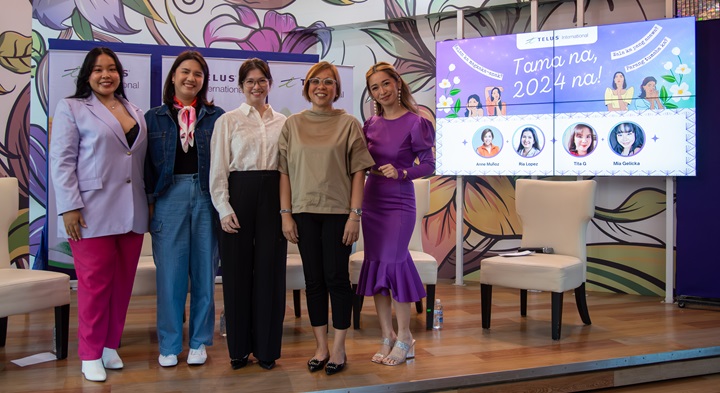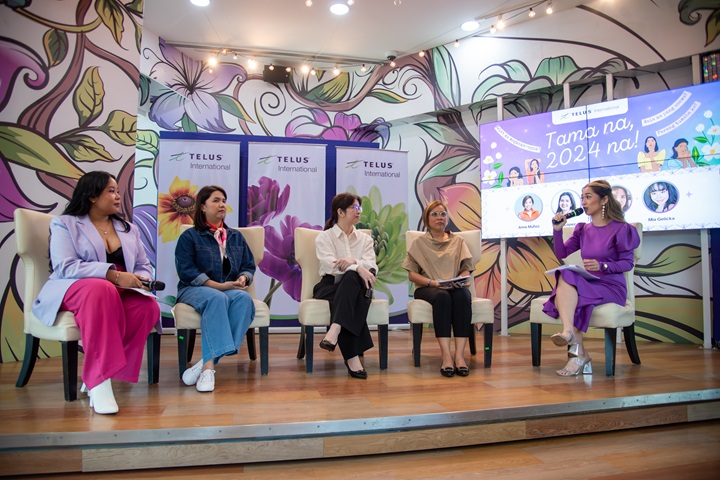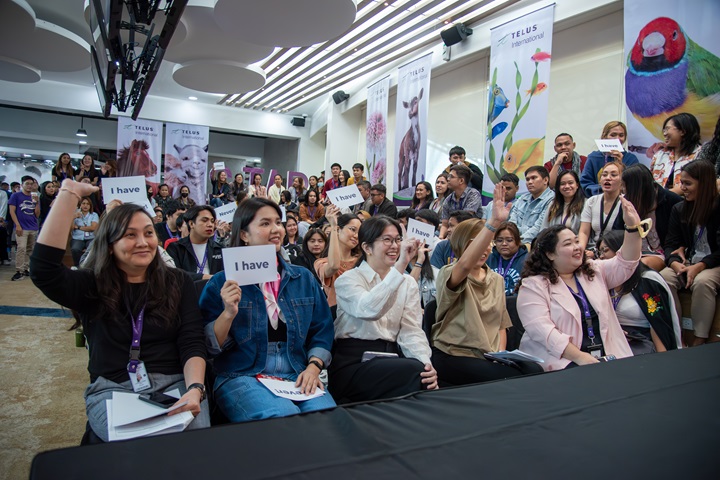
TELUS International Philippines (TIP), a leading AI-fueled customer experience and business process solutions provider, kicked off Women’s Month with a powerful event entitled, “Tama na, 2024 na!” featuring Filipinas sharing personal journeys about defying societal expectations and carving out their unique paths.
Attended by team members from all TIP sites across Metro Manila and Iloilo, the speakers’ personal stories highlighted how they challenged cultural stereotypes while providing a supportive, safe, and inclusive space for others to share their experiences, obstacles, and triumphs. During the event, TIP also shared insights from its recent *survey of over 3,500 team members from its 10 sites in the country. The idea for doing the survey stemmed from the company’s leaders’ desire to better understand the gender bias experiences of TIP’s Filipina community, following the results of the 2023 UNDP Gender Social Norms Index (GSNI) report, which found that 99.5% of Filipinos held biases against women.
Breaking free from societal expectations
TIP’s talk shed light on the societal pressures and expectations Filipino women face regarding marriage, motherhood, and career choices and how despite this, Filipino women are increasingly delaying marriage, choosing not to have children, pursuing diverse relationships, and balancing career and motherhood. To celebrate their courage and strength, personal journeys and motivations, TIP invited a group of inspiring modern Filipinas to share their stories.
During her talk, curve model and body positivity advocate Mia Franz-Gelicka shared how she initially felt pressured to conform to societal expectations of beauty, but eventually discovered her path to wellness and self-love. Meanwhile, Tita G (Grace), a working millennial with a communication arts background says she continues to face unwelcome remarks in family gatherings, emphasizing the importance of prioritizing aspirations and not allowing external opinions dictate life choices.
“At TELUS International, we proactively make room for these important discussions around women, addressing pressing concerns with empathy, respect, and support for every woman’s unique journey,” emphasized Anne Muñoz, Country Vice-president at TIP. “We must break free from these suffocating norms and collectively cultivate an inclusive culture.”
Pinays are still receiving questions about weight and relationships

According to the survey, women continue to receive unwelcome questions and comments about their physical appearance, relationship status and personal life choices. Nearly half (46%) of the respondents who identified as women said they had experienced unwelcome questions such as, “When are you getting married?” and “Why don’t you have a boyfriend yet?” and 67% of respondents had received comments such as, “Looks like you gained weight.”
The survey data revealed that these remarks which reflect societal pressures on women are mainly influenced by factors like family upbringing (71%), local culture/cultural traditions (75%), and media (41%).
The office is the safest place from unsolicited questions and comments for women
The survey also revealed that these questions were most often asked by friends (72%), relatives (66%) and immediate family members (50%). The workplace, according to the respondents, is the safest place from questions, with workplace leaders (4%) and teammates (11%) being among the least likely sources of these questions.
A lesson in treating others the way we want to be treated

Surprisingly, 74% of the survey respondents who identified as women said that they had asked ‘unwelcome’ questions to other women. Over 78% of the respondents who identified as male said they asked women they knew these questions and 87% of those who did not identify as either male or female, or preferred not to say their gender said they did the same.
Those on the receiving end of the questions noted that it affected them emotionally. They felt irritated, inadequate, and pressured to conform to physical attributes and lifestyle choices not of their choosing. The survey respondents also said the remarks and questions had negatively impacted their self-esteem (51%), decisions about their future (24%) and interactions with others (38%).
The survey data revealed that these pressures are mainly influenced by factors like family upbringing (71%), local culture/cultural traditions (75%), and media (41%).
As part of the survey, TIP team members were asked to share their thoughts about how women should deal with the expectations imposed on them by society. Their responses varied, with some suggesting that women should ignore these pressures and just focus on what they want for themselves, while others emphasized the importance of educating individuals who perpetuate stereotypical expectations. They believe that this can lead to a better understanding and acceptance of women’s choices and abilities.
Defining and empowering the ‘modern Filipina’
Tama na, 2024 na! emphasized the importance of celebrating women’s diverse roles in promoting inclusivity and equality, and everyone’s responsibility to challenge cultural gender stereotypes. Discussions during the event defined the modern Filipina as someone who fearlessly embraces her identity, challenges societal norms, and navigates the complexities of life on her own terms.
Aligned with this description and vision, the Connections Women’s Network, TIP’s women-focused employee resource group, plays a vital role in promoting an inclusive and diverse workplace. They do this by supporting, inspiring, and empowering women to pursue career excellence, personal and professional growth, and community involvement that contributes to fostering a culture of empowerment and inclusivity.
“TELUS International Philippines is committed to continuing to foster an inclusive and supportive environment for our team members in which every individual feels safe bringing their authentic selves to work every day,” added Muñoz. “We believe in leading by example, demonstrating empathy, respect, and support for every woman’s unique journey within our organization, at home and in their communities.”

